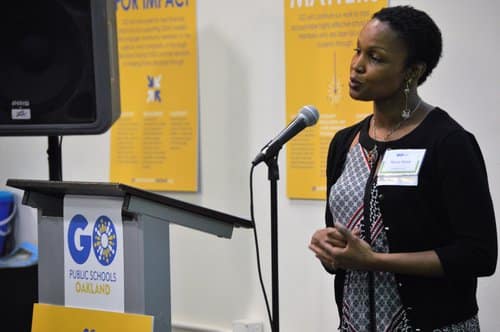STRATEGY 4: EXERCISING THE POWER OF THEIR VOTE
 In some communities, parents have organized to vote with their voice and influence votes by current public officials. In other communities, parents are finding that the only avenue to changing their school and school system is influencing votes for public officials through electoral activism. In Oakland, GO Public Schools established both a 501(c)3 for community organizing and a 501(c)4 to be involved in electoral work.
In some communities, parents have organized to vote with their voice and influence votes by current public officials. In other communities, parents are finding that the only avenue to changing their school and school system is influencing votes for public officials through electoral activism. In Oakland, GO Public Schools established both a 501(c)3 for community organizing and a 501(c)4 to be involved in electoral work.
“We realized that expanding equity and opportunity in education in our community required not only parents raising their voice with school leaders, but also parents using their power to elect leaders who would take responsibility for student outcomes, drive progress, and recognize their accountability to the community,” says CEO Jonathan Klein
GO parents interview school board candidates and recommend who GO should endorse and support during an election. As of 2017, GO-endorsed candidates have won eight of the ten Oakland school board elections since 2012, fundamentally reshaping the school board’s political will to drive change in areas ranging from district policies around funding, effective teaching, teacher raises, and the transformation of underperforming schools, to the approval of high-quality charter applications.Remember Maribel Gonzalez, from South Central Los Angeles? She worked hard to catch up and successfully graduated from UCLA. She then became a teacher, went to law school, eventually became an education organizer and is now California managing director of Students for Education Reform (SFER). SFER organizes college students, many of whom are the first in their family to go to college, in how to be organizers and lifelong education activists. In California, SFER organizers have been critical in engaging door-to-door to inform and organize local communities to exercise their power with their vote. They are helping to turn disenfranchised, low-propensity voters out to the polls to determine their school board representatives.
“People in the communities we work in, they don’t know what the school board is or what power it has,” Gonzalez explains. “They haven’t been exposed to authority beyond a school principal. Through SFER Action Network, they get to hear from credible members of their own community — college students they want their kids to look up to. They are grateful someone respects them enough to take the time to explain how the system works and ask them what they want from that system for their children and community. And they respond to people who explain to them that they have power and who help them learn how to use it.”
One caveat to this strategy: Voting with your vote is not just about changing who is elected to public office. It also can manifest as communities exercising their power to support the political will of sitting public officials, who sometimes have an ardent desire to make a difficult change but need to know they have political cover and community support to act on it while being able to remain in office.
An additional caveat: While there are ways 501(c)3 nonprofits can be involved in electoral activism, including voter registration, they cannot endorse candidates or legislation. This work must be done through a 501(c)4 entity or via an independent expenditure. 501(c)3’s can do limited work in support of ballot initiatives.
It is crucial nonprofits seeking to play in this strategy have strong, knowledgeable legal counsel, and build the staff skills and systems infrastructure to abide by compliance requirements.

225 Franklin Street, Suite 350
Boston, MA 02110
617.912.8800
This work is licensed under a Creative Commons Attribution-NonCommercial-ShareAlike 2.0 License (CC BY-NC-SA 2.0)
Click Here to learn more.

